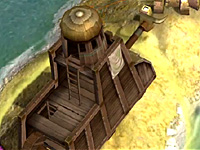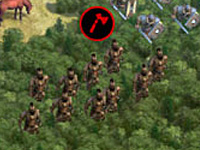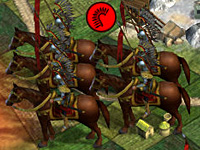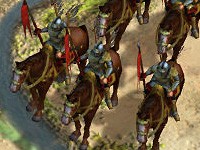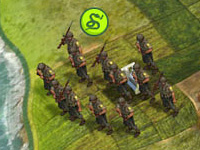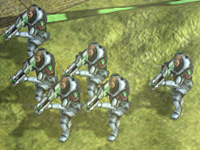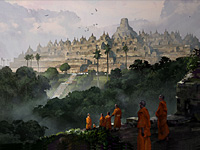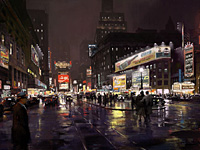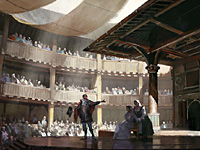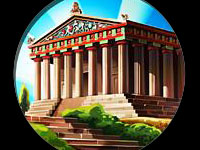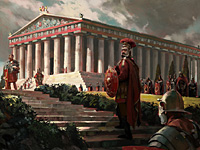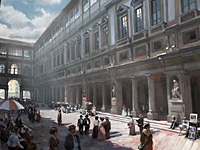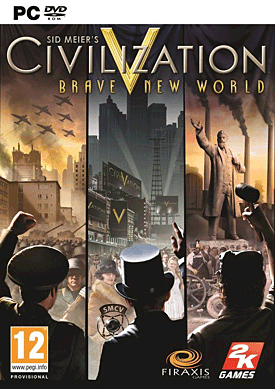 *This page last updated:
08 September, 2014 22:11
PST. (Log of recent changes)
*This page last updated:
08 September, 2014 22:11
PST. (Log of recent changes)
Disclaimer: The information listed below represents pre-release information on a
game under development, and so may be incomplete and subject to change.
CIVILIZATION V: BRAVE NEW WORLD Expansion Pack
On March 15, 2013 2K announced an expansion pack for Civilization V, titled "Brave New World." It was released on July 9th in the US and July 12th elsewhere for a suggested retail price of USD $29.99. The Lead Designer on the project is Ed Beach, who performed the same role for Gods & Kings, the previous expansion. See the official site here. The Steam online manual can be read here.
What's New in Brave New World
- Updated Culture System
- Updated Diplomacy
- International Trade Routes
- 9 New Civilizations
- 8 New Wonders
- 2 New Scenarios
- 20 New Units
- Technology Changes
- Miscellaneous Changes
- New Improvements
- Unidentifed Items
- Links to Previews
Updated Culture System
Instead of being based on filling out Social Policy trees, Cultural Victory is now achieved through generation of a new culture-related resource, Tourism. There are several new culture-related mechanics:
Tourism
Tourism exerts a kind of offensive cultural pressure on the civilizations around you. Tourism is generated by Wonders and buildings that have Great Works or Artifacts housed in them. Tourism is increased with Open Borders agreements (+25%), Trade Routes (+25%), and shared religion. Tourism is countered by the foreign civilization's own Culture; your Tourism is measured against that Culture, and ranked from "Exotic" (10%) to "Familiar" (30%) to "Popular" (60%) to "Influential" (100%+). (There is also a new higher level seen in recent shots, "Dominant" (200%), but it's not clear what this means.) If your Tourism exceeds the other civilization's defensive Culture, then you are Influential; become Influential with all other civilizations to win a Culture Victory. Successful Tourism creates Unhappiness in civilizations with different Ideologies than you have chosen.
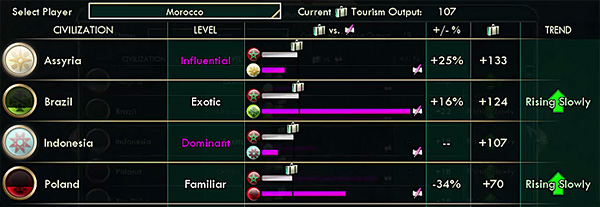
There is a new telltale on the main map top bar for Tourism (represented by a suitcase icon).
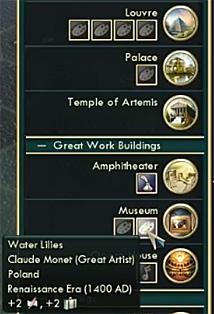 Great Works
Great Works
Great Artists are now split into three types: Great Artists, Great Writers and Great Musicians can now generate named Great Works, which are housed within appropriate buildings like Museums or Opera Houses or Libraries, and generate both additional Culture and Tourism points. There appear to be three types of slots for Great Works, represented by palette, note and quill icons, available in different buildings:
- Palette: Great Work of Art (or Artifact): Museum, Palace, Louvre
- Note: Great Work of Music: Opera House
- Quill: Great Work of Writing: Amphitheater, Library, Great Library
Great Works can be moved between buildings or cities as desired, and they can be traded with other civilizations. When similarly-themed Great Works are grouped together in the same building, it's possible to get an additional bonus. Different building will have different requirements to get a Theme Bonus: a regular Museum gets a +2 bonus for similar works from a similar period, but the Louvre requires a diversity of works from different civilizations and periods to earn a bonus.
New Great Person action: Create Great Work: This order will consume the Great Person and create a new Great Work in the nearest city with a Great Work slot of the appropriate type.
Each individual named Great Artist, Writer, or Musician creates a Great Work specific to that historical artist. For example, the Great Writer William Shakespeare creates the Great Work "Macbeth." There are too many named artists and works to list here.
 Archaeology
Archaeology
Great Works can also be obtained through the new Archaeology system. After you research Archaeology, you'll be able to build Archaeologist units that can visit Antiquity Sites throughout the map (such the site of a battle fought earlier in the game, a previously discovered Ancient Ruin, a previously pillaged resource, or a previously destroyed Barbarian Camp) and search them for Artifacts you can display in Museums or other appropriate buildings. Artifacts appear to be interchangeable with Great Works of Art, fitting in the same slots in the same buildings as Works created by Great Artists.
Artifacts can be extracted both in your own territory and in City-State or foreign civilization territory -- provided that you have an Open Borders agreement. However, creating dig sites in foreign territory will create diplomatic tension with that civilization; they won't appreciate your removing their historical artifacts.
Archaeologist units search for Antiquity Sites, which are revealed on the map with the discovery of Archaeology. The Archaeologist can convert the Antiquity Site into an Archaeological Dig, which after 3 turns can either yield a Great Work Artifact or be transformed into a Landmark improvement. The Archaeologist unit is consumed in this process. Archaeology is now the only way to create Landmark improvements; the ability to create Landmarks has been removed from the Great Artist.
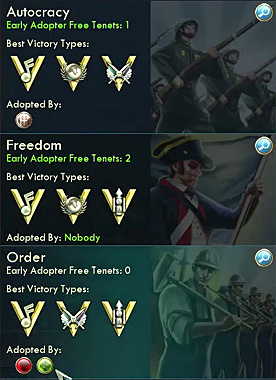 Ideologies
Ideologies
You must choose one of three Ideology options (Freedom, Order or Autocracy) once you either build 3 Factories or reach the Modern Era. These Ideologies are now separate from the normal Social Policy trees, which have been changed (see below). In addition to determining which Tenets (similar to Social Policies) are available to you, your choice of Ideology will impact your relations with other civilizations, improving relations with those of the same Ideology, and degrading those who have chosen a different one. Helpfully, in the dialog where you are asked to choose an Ideology, you are shown the Ideologies of those other civilizations who have already made a choice. It is possible to change Ideologies, but not when your people are content (see Public Opinion, below).
If you are the one of the first two civilizations to adopt a particular Ideology, you will be awarded one or two free "Early Adopter" tenets.
Ed Beach: "The different victory types are allied with Ideologies. So each Ideology is good at three out of the four victory types. If I'm going for a Space Race victory, for instance, I have to go either Freedom or Order. I have to go either the Soviet space model or the US space model."
Public Opinion
There is a new status for each civilization linked to Ideology called Public Opinion, which is displayed in the Culture Victory tab of the Culture Overview dialog. It measures a civilizations' satisfaction with their current Ideology choice. If another civilization with a different ideology begins to overwhelm your culture with their tourism, then your Public Opinion will begin to decline. Possible value are Content, Dissidents, Civil Resistance, and Revolutionary Wave. Some level of Unhappiness will be generated if this satisfaction level is anything other than Content. At an overall Happiness level of -20 or below the civilization will start to lose cities to revolt and may change the public's Preferred Ideology (you can find that preference in the Public Opinion tooltip). If this situation becomes bad enough, you may have to switch Ideologies to placate your public. This would presumably mean losing access to the Tenets that you have purchased. It's not currently clear what "revolt" means specifically, whether cities go into a state of anarchy, or whether they actually change allegiance to another civilization.
Dennis Shirk: "If I choose say, Order, and you’re Freedom, and I’m generating all this Tourism, my influence is going to start pressing on your empire and your people are going to start getting unhappy. If you let it go on too long, you basically have to either declare war on me or switch to my ideology. Your cities might start flipping to my civilization if they riot too much."
Kate Distler: "When your happiness gets down to -20, then your Cities will start abandoning your empire. If your people are this unhappy, they will have a Preferred Ideology they’d like to switch to. We look at all your cities to see how close they are to the capital cities of the civs following that Ideology (and how much pressure you are receiving from each of those civ’s cultures). Based on those factors we can pick the city that will flip (and which civ it will defect to)."

Tenets
Each Ideology has a three-tiered set of 16 policies called Tenets that can be purchased with Culture; after you have chosen an Ideology, when you earn enough Culture to purchase a Social Policy, you are given the choice of either purchasing a Social Policy or purchasing a Tenet. Every Tenet after the first in a tier unlocks one Tenet in the next tier, but the requirements are not specific as in Social Policies; within a tier, you can choose any Tenet that you want, similar to Beliefs.
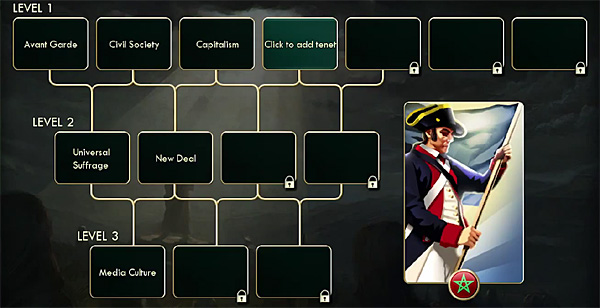
Order
- Level 1
- Hero of the People: The rate at which Great People are born is increased by 25%.
- Socialist Realism: +2 Local Happiness from Monuments. Build Monuments in half the usual time.
- Skyscrapers: Gold cost of purchasing buildings reduces by 33%.
- Patriotic War: +15 attack bonus when fighting in friendly territory.
- Double Agents: Spies twice as likely to capture enemy spies attempting to steal a technology.
- Young Pioneers: +1 local Happiness from every Workshop, Factory, and Solar/Nuclear/Hydro Plant.
- Universal Healthcare: +2 Local Happiness from every National Wonder.
- Level 2
- Academy of Sciences: +1 Local Happiness from every University, Observatory, Public School, and Research Lab.
- Party Leadership: +1 Food, Production, Science, Gold and Culture per city.
- Resettlement: New Cities start with an extra 1 Population.
- Cultural Revolution: +34% Tourism to other Order civilizations.
- Worker's Faculties: Factories increase a City's Science output by 25%. Build Factories in half the usual time.
- Five-Year Plan: +2 Production per City and +1 Production for every Mine and Quarry.
- Level 3
- Dictatorship of the Proletariat: +34% Tourism to civilizations that have less Happiness.
- Iron Curtain: Free Courthouse upon city capture.
- Spaceflight Pioneers: May finished Spaceship parts with Great Engineers. +10 Science in Capital City.
Freedom
- Level 1
- Avant Garde: The rate at which Great People are born is increased by 25%.
- Creative Expression: +1 Culture from each Great Work (but Tourism is unchanged).
- Civil Society: Specialists consume only half the normal amount of Food.
- Covert Action: Chance of rigging election in City-States doubled.
- Capitalism: +1 Local Happiness from every Mint, Bank, and Stock Exchange.
- Economic Union: +3 Gold from all your trade routes with other civilizations following the Freedom Ideology.
- Universal Healthcare: +2 Local Happiness from every National Wonder.
- Level 2
- Volunteer Army: Receive 6 free Foreign Legion units (no maintenance)
- Urbanization: +1 Local Happiness from every Granary, Water Mill, Aqueduct, and Hospital.
- Their Finest Hour: Combat Strength of Cities increased by 33%.
- Universal Suffrage: Specialists in Cities produced half the normal amount of Unhappiness. Golden Ages are 50% longer.
- New Deal: All Great Person improvements produce +4 of the appropriate yield.
- Arsenal of Democracy: +25% Production when building Military Units. +20 Influence from Military Unit gifts to City-States.
- Level 3
- Media Culture: +34% Tourism generated by cities with a Broadcast Tower.
- Treaty Organization: Gain 4 more Influence per turn (at Standard speed) with City-States you have pledged to protect.
- Space Procurements: Buy Spaceship parts for gold
Autocracy
- Level 1
- Elite Forces: Wounded Military Units inflict 25% more damage than normal.
- Mobilization: Gold cost of purchasing units reduced by 33%.
- United Front: Militaristic City-States grant units twice as often when you are at war with a common foe.
- Futurism: +100 Tourism with all known civs when a Great Writer, Artist or Musician is born.
- Industrial Espionage: Spies steal technologies at twice the normal rate.
- Fortified Borders: +2 Local Happiness from every Walls, Castle, Arsenal and Military Base.
- Universal Healthcare: +2 Local Happiness from every National Wonder.
- Level 2
- Militarism: +2 Local Happiness from every Barracks, Armory and Military Academy.
- Lightning Warfare: +3 Movement for Great Generals. Armor units gain +15% attack, +1 Movement and ignore enemy ZOC.
- Police State: +3 Local Happiness from every Courthouse. Build Courthouses in half the usual time.
- Nationalism: Reduces Unit Gold Maintenance costs by 33%.
- Third Alternative: Quantity of Strategic Resources produced is increased by 100%. +5 Food and +5 Science in Capital.
- Total War: +25% Production when building Military Units and new Military Units start with +15 Experience.
- Level 3
- Cult of Personality: +50% Tourism to civilizations fighting a common enemy.
- Clausewitz's Legacy: Receive a 25% attack bonus to all Military Units for the first 50 turns after this policy is adopted.
- Gunship Diplomacy: +6 Influence boost each turn with City-States from which you could demand tribute
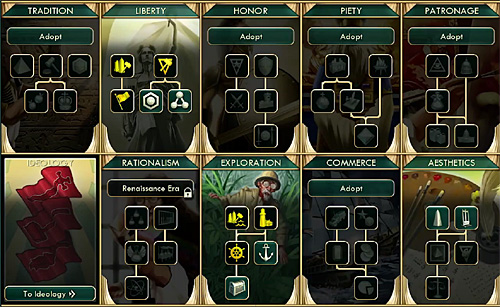 Social Policy Changes
Social Policy Changes
The Social Policy screen has changed: it still has 10 slots as before, but there are now 9 Social Policy trees (Tradition, Liberty, Honor, Piety, Patronage, Rationalism, Commerce, Exploration and Aesthetics), and the 10th slot is for your chosen Ideology. Order, Freedom and Autocracy have been moved to Ideologies, and so there are now two new tree to take their place: Aesthetics and Exploration. Commerce and Piety have also been significantly changed, and policies in many trees have been shuffled around. Each tree now unlocks a particular World Wonder:
Tradition: Hanging Gardens
Liberty: Pyramids
Honor: Statue of Zeus
Piety: Great Mosque of Djenne
Patronage: Forbidden Palace
Aesthetics: Uffizi
Commerce: Big Ben
Exploration: Louvre
Rationalism: Porcelain Tower
Here is the updated list of Social Policies for Brave New World (changes from Gods & Kings are marked in red):
Tradition is best for small empires. Adopting Tradition greatly increases the rate of border expansion in cities and also grants +3 Culture in the Capital. Unlocks building the Hanging Gardens. Adopting all Policies in the Tradition tree will grant +15% Growth and a free Aqueduct in your first 4 cities. It also allows the purchase of Great Engineers with Faith starting in the Industrial Era.
- Aristocracy: +15% Production when building Wonders and +1 Happiness for every 10 Citizens in a City.
- Legalism: Provides a free culture building in your first 4 cities.
- Oligarchy: Garrisoned units cost no maintenance and cities with a garrison gain +50% Ranged Combat Strength.
- Landed Elite: +10% Growth and +2 Food in the Capital. (requires Legalism)
- Monarchy: +1 Gold and -1 Unhappiness for every 2 Citizens in the Capital. (requires Legalism)
Liberty is best for civilizations which desire rapid expansion. Adopting Liberty will provide 1 Culture in every city. Unlocks building the Pyramids. Adopting all policies in the Liberty tree will grant a free Great Person of your choice near the Capital.
- Republic: +1 Production in every City and +5% Production in cities when construction Buildings.
- Citizenship: Tile improvement construction rate increased by 25% and a Worker appears near the Capital.
- Collective Rule: Speeds the training of Settlers by 50% in the Capital and a free Settler appears near the Capital. (Venice receives a Merchant of Venice instead of a Settler.) (requires Republic)
- Representation: Each city you found will increased the Culture cost of policies by 33% less than normal. Also starts a Golden Age. (requires Citizenship)
- Meritocracy: +1 Happiness for each City you own connection to the Capital and -5% Unhappiness from Citizens in non-occupied Cities. (requires Citizenship)
Honor improves the effectiveness of one's army in a variety of ways. Adopting Honor gives a +33% combat bonus vs Barbarians, and notifications will be provided when new Barbarian Encampments spawn in revealed territory. Gain Culture for the empire from each barbarian killed. Unlocks building the Statue of Zeus. Adopting all policies in the Honor tree will grant Gold for each enemy unit killed. It also allows the purchase of Great Generals with Faith starting in the Industrial Era.
- Warrior Code: +15% Production when training Melee units and a Great General appears outside the Capital. Great Generals are earned 25% faster.
- Discipline: +15% Combat Strength for melee Units which have another military Unit in an adjacent tile.
- Military Tradition: Military Units gain 50% more Experience from combat. (requires Warrior Code)
- Military Caste: Each City with a garrison increases Local City Happiness by 1 and Culture by 2. (requires Discipline)
- Professional Army: Gold cost of upgrading Military Units reduced by 33% and construct Barracks, Armories, and Military Academies 50% faster. (requires Military Caste)
Piety is now dedicated to religion. Adopting Piety allows you to build Shrines and Temples in half the usual time. Unlocks building the Great Mosque of Djenne. Adopting all Policies in the Piety tree causes a Great Prophet to appear and Holy Sites provide +3 Culture. Piety is no longer mutually exclusive with Rationalism.
- Organized Religion: +1 Faith from Shrines and Temples.
- Mandate of Heaven: 20% discount on all purchases of religious units and buildings with Faith.
- Theocracy: Temples increase a city's Gold output by 10%. Holy Sites provide +3 Gold. (requires Organized Religion)
- Religious Tolerance: Cities with a majority religion also get the Pantheon belief bonus of the second most popular religion. (requires Organized Religion)
- Reformation: If you founded a religion, gain a bonus Reformation belief. (requires Mandate of Heaven, Religious Tolerance)
Commerce has had the two naval-oriented bonuses moved to Exploration. "Adopting Commerce will boost Gold output in the Capital by 25%. Unlocks building Big Ben. Adopting all policies in the Commerce tree will grant +1 Gold for every Trading Post and double Gold from Great Merchant trade missions. It also allows you to purchase Great Merchants with Faith starting in the Industrial era."
- Wagon Trains: +2 Gold from all your Land Trade Routes.
- Trade Unions: Maintenance paid on Roads and Railroads reduced by 50%.
- Entrepreneurship: Great Merchants are earned 25% faster. (requires Wagon Trains)
- Mercantilism: Purchasing items in Cities requires 25% less Gold. +1 Science from every Mint, Market, Bank and Stock Exchange. (requires Trade Unions)
- Protectionism: +2 Happiness from every Luxury Resource. (requires Entrepreneurship and Mercantilism)
Aesthetics is a new Policy tree that improves the civilization's ability to generate Culture. It is unlocked in the Classical era. Adopting Aesthetics allows you to earn Great Writers, Artists and Musicians 25% faster. Unlocks building the Uffizi. Adopting all policies doubles the theming bonus you receive from your Museums and Wonders. It also allows the purchase of Great Writers, Artists, or Musicians with Faith starting in the Industrial Era.
- Cultural Centers: Construct Monuments, Amphitheaters, Opera Houses, Museums and Broadcast Towers 50% faster.
- Fine Arts: 50% excess Happiness added each turn to the amount of Culture that may be spent on Social Policies.
- Flourishing of the Arts: Culture increased by 33% in all cities which have built a World Wonder and the empire immediately enters a Golden Age. Requires Cultural Centers and Fine Arts.
- Artistic Genius: A Great Artist appears. Requires Fine Arts.
- Ethics: Reduces the Culture cost of future Policies by 10%. Requires Flourishing of the Arts.
Exploration is a new Policy tree, containing most of what used to be in the Commerce tree. Exploration enhances your ability to spread your empire over the seas. Adopting Exploration gives +1 Movement for Naval units and +1 Sight for Naval Combat units. Unlocks building the Louvre. Adopting all policies allows you to see Hidden Antiquity Sites. It also allows the purchase of Great Admirals with Faith starting in the Industrial Era. Exploration is unlocked in the Medieval era.
- Maritime Infrastructure: +3 Production in all coastal Cities.
- Naval Tradition: +1 Happiness for each Harbor, Seaport, or Lighthouse.
- Navigation School: A Great Admiral appears. +2 Movement for all Great Admirals. Great Admirals are earned 25% faster. Requires Naval Tradition.
- Merchant Navy: +1 Gold for each Harbor, Seaport or Lighthouse. Requires Maritime Infrastructure and Naval Tradition.
- Treasure Fleets: +4 Gold from all your sea trade routes. Requires Merchant Navy.
Patronage: Unlocks at Medieval Era. Adopting Patronage will cause Influence with City-States to degrade 25% slower than normal. Unlocks building the Forbidden Palace. Adopting all policies in the Patronage tree will cause allied City-States to occasionally gift you Great People (and no longer causes other players' Influence with City-States to decrease).
- Philanthropy: Gifts of Gold to a City-State generate 25% more Influence.
- Consulates: Resting point for Influence with all City-States is increased by 20.
- Scholasticism: All City-States which are Allies provide a Science bonus equal to 25% of what they produce for themselves. (requires Philanthropy)
- Cultural Diplomacy: Quantity of Resources gifted by City-States increased by 100%. Happiness from gifted Luxuries increased by 50%. (requires Scholasticism)
- Merchant Confederacy: +1 Gold for trade routes with City-States.
Rationalism: Adopting Rationalism with grant +10% Science while the empire is Happy. Unlocks building the Porcelain Tower. Adopting all policies in the Rationalism tree will grant a free Technology. It also allows the purchase of Great Scientists with Faith starting in the Industrial Era. Rationalism is no longer mutually exclusive with Piety.
- Secularism: +2 Science from every Specialist.
- Humanism: Great Scientists are earned 25% faster.
- Free Thought: +1 Science from every Trading Post and +17% Science from Universities. (requires Secularism).
- Sovereignty: +1 Gold from Science buildings. (requires Humanism).
- Scientific Revolution: Boosts Science gained from Research Agreements by 50%. (requires Free Thought).
Updated Diplomacy
A vote in the United Nations still determines the winner of a Diplomatic Victory, but the UN now has an earlier incarnation called the World Congress. Dennis Shirk mentioned that diplomatic AI is being fine-tuned, to be less "schizophrenic" and more amenable to long-term friendships.
 World Congress
World Congress
Prior to the creation of the United Nations you'll have the option to interact with other civilizations via the World Congress. This body is created once any civilization meets every other nation in the world and researches Printing Press; that civilization become the Congress' host and receives several benefits. After it's established, every civilization gets a number of delegates that they can use to vote on resolutions (allied city-states also supply you with delegates). The two resolutions that are voted on each session are picked one by the host nation that first created the World Congress, and the other by the current leader who has the most delegates. The Congress initially meets every 30 turns, but the frequency increases as the game progresses. Delegates are assigned to each civilization, with the host getting twice as many. The number of delegates increases for each civilization as it reaches a new era, and in later eras City-State allies also contribute delegates. Ed Beach: "After the first resolutions are proposed, there’s a countdown until the Congress convenes, which will give you time to get allies on your side before the Congress votes on the proposed resolutions. The process then begins again, with the proposal of resolutions."
Rather than voting up or down on each resolution, you allocate each of your available delegates to a yes or no vote on one resolution or the other. For example, if you have two delegates, you can allocate both votes to one resolution or split them between two. Votes can be traded for or straight-up bought. Once passed, resolutions must be obeyed and cannot be ignored, but they can be repealed in subsequent meetings of the Congress (the vote process is the same as for passing them). Resolutions the World Congress can act on include:
- World Leader: Designate a World Leader. If a Civilization receives support from enough Delegates in the Congress, that leader will attain Diplomatic Victory. The number of Delegates needed depends on the number of Civilizations and City-States in the game, and can be seen on the World Congress screen. If no Civilization receives enough support to win, the two Civilizations who received the most support permanently gain an additional Delegate to use in future sessions. May not be proposed by a Civilization. Automatically proposed at regular intervals once the World Congress becomes the United Nations.
- Choose Host: Designate a Civilization to host the Congress. Being the host grants additional Delegates and the ability to propose resolutions. May not be proposed by a Civilization. Automatically proposed as Civilizations advance to later eras.
- Ban Luxury: A Luxury resources is designated as immoral, endangered or otherwise inappropriate for use by the general population. As long as the ban is in place, Civilizations receive no Happiness benefit from this Luxury resource.
- Embargo City-States: No International Trade Routes can be established with City-States. Any such Trade Routes are ended and must be reassigned.
- Embargo: No International Trade Routes can be established between the chosen Civilization and any other Civilization. Any such Trade Routes are ended and must be reassigned.
-
 World's Fair: Begins the World's Fair project. Once underway,
Civilizations can contribute Production towards its completion by selecting
it in the city production list. When complete, Civilizations receive bonuses
based on how much they contributed. (1st place: Culture increased by 100%
for 20 turns; 2nd place: Free Social Policy; 3rd place: 500 points towards
next Golden Age.) Available once any Civilization discovers (?).
World's Fair: Begins the World's Fair project. Once underway,
Civilizations can contribute Production towards its completion by selecting
it in the city production list. When complete, Civilizations receive bonuses
based on how much they contributed. (1st place: Culture increased by 100%
for 20 turns; 2nd place: Free Social Policy; 3rd place: 500 points towards
next Golden Age.) Available once any Civilization discovers (?). - International Games: Begins the International Games project. Once underway, Civilizations can contribute Production towards its completion by selecting it in the city production list. When complete, Civilizations receive bonuses based on how much they contributed. (1st place: Tourism increased by 100% for 20 turns, Free Social Policy; 2nd place: +3 Happiness, one-time increase of 30 Influence with City-States; 3rd place: +3 Happiness.) Available once any Civilization discovers Radio.
- International Space Station: Begins the International Space Station project. Once underway, Civilizations can contribute Production towards its completion by selecting it in the city production list. When complete, Civilizations receive bonuses based on how much they contributed. (1st place: International Space Station wonder appears in the Capital; 2nd place: Free Great Scientist; 3rd place: One time research boost.) Available once any Civilization discovers Satellites. (For more see the ISS wonder entry.)
- Standing Army Tax: Unit maintenance costs are increased by 25% Gold.
- Scholars In Residence: Members research technologies 20% faster if another member has already researched it
- Nuclear Non-Proliferation Treaty: All Civilizations are prevented from constructing new nuclear weapons (Atomic Bomb and Nuclear Missile). Weapons already constructed, however, are not disarmed. Available once any Civilizations discovers Advanced Ballistics.
- Cultural Heritage Sites: Wonders yield +3 Culture
- Natural Cultural Sites: Worked Natural Wonders yield +5 Culture
- World Religion: The civilization which has the most cities of this religion gets +2 delegates, this religion spreads faster, and the Holy City generates +50% Tourism
- World Ideology: Designate an Ideology as the official World Ideology. Civilizations following that Ideology get an additional 2 Delegates. Public opinion in favor of that Ideology is increased for all Civilizations. There can be only one World Ideology at a time. Available once any civilization discovers Radio.
- Art Funding: Increases generation of Great Writers, Artists and Musicians by 33%. Decreases generation of Great Scientists, Engineers and Merchants by 33%.
- Science Funding: Increases generation of Great Scientists, Engineers and Merchants by 33%. Decreases generation of Great Writers, Artists and Musicians by 33%.
- Historical Monuments: +2 Culture for each Great Person Improvement, +4 Culture for each Historical Landmark
Note: the rewards for the International Games as similar contest projects appear to be cumulative; in other words, if you win first place, you get all three rewards.
Late in the game, the World Congress becomes the United Nations, and there's an automatic new resolution to elect a world leader, which comes up every 10 turns until one is chosen, ending the game in diplomatic victory.
Ed Beach: "As it gets further and further along and you start going towards the diplomatic victory, you can send spies to other people's capital cities and use them as leverage to find out what the other states are going to vote for in the World Congress; you can actually trade votes in the World Congress as well."
Diplomat
There is a new type of Spy, the Diplomat. It is sent to a city like a regular Spy, but it doesn't steal techs, but instead listens for Intrigue and reports on how a civilization intends to vote on World Congress resolutions. If you have a Diplomat in a civilizations' city come vote time, you can use the Diplomat as a contact to facilitate vote-trading or vote-buying.
Diplomats are converted from normal Spies. "Do you want this spy to be a diplomat? A spy can be a diplomat if they are placed in the capital of another civilization you are not at war with. (If war is declared, your spy will escape the city.) A diplomat will not attempt to steal technology from the other player but will still provide intrigue. Once the World Congress convenes and the diplomat has begun schmoozing, you will be able to determine their opinion on proposals and trade for their support if needed. Diplomats also conduct propaganda that provides a boost to Tourism output to the target civilization."
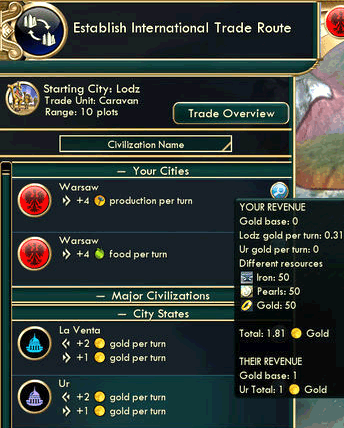 International Trade Routes
International Trade Routes
International Trade Routes replace the extra gold previously earned from working river or coast tiles. You can now build special Trade Units such as the Caravan and Cargo Ship, and set them up so that they automatically follow a route back and forth between two cities. You start the game with two available routes, and more can be unlocked as the game progresses (typically at least seven or eight by the end of the game). Certain technologies, Wonders and civilization Unique Abilities increase the available number of International Trade Routes.
Note that the existing Trade Routes formed by road and rail connections to the Capital appear to still exist. Hence the "International" designation of the new Trade Route system. Dennis mentioned that these old trade routes are now called "City Connections."
Clicking on a Trade Unit in a city brings up a list of possible routes for that unit type from that city. Trade with one of your own cities can transfer food (if you have a Granary) or production (if you have a Workshop). Food or Production from an internal Trade Route are bonus; they are not drained from the source city's own output. Trade with a foreign city brings gold to both parties, the amount of which depends on a number of factors. Sea routes appear to be twice as lucrative as land routes (with an explicit "2x" modifier). Trade routes from cities next to a river gain +25% Gold. The per-turn gold value of the Trade Route increases with the distance of the route, the difference in local resources between the two cities, and the existence of Markets and other trade-related buildings in your city. In addition to gold, trade routes can also transmit religion, and cultural influence, and this transmission can go both ways. Trade with a partner who is ahead of you in technology can yield science for you. Trade Routes generate a positive diplomatic modifier with the trading partner.
Trade Routes last for 30 turns (on Standard game speed), after with the unit will ask to be reassigned, but it appears that the route can be manually cancelled at any time. The Trade Units operating the trade routes can be attacked, allowing you to disrupt other civilization's trade routes if you go to war with them. This also means your own trade routes must be protected from barbarians and enemy civilizations. There will be a player-toggled map overlay displaying trade routes (you can see one in this shot coming out of Sao Paolo and another in this shot coming out of Nineveh). A city may have more than one trade route.
Ed Beach: "Although both parties gain gold from the route, the civilization that the trade route originates from gets a larger sum of gold than the destination civilization. Additionally, other systems hitch a ride on trade routes, like religious pressure, science (science can be gained from more advanced civilization this way), Tourism bonuses, and more. Trade routes can also be created between two cities of the same civilization. Once the origin city has a Granary, it can send food to the destination city, and once it has a Workshop it can send production. This can be powerful if you have a new city that needs to be “pumped up”, or a city that’s constructing a Wonder that could use a production bump.
"A lucrative trade route is going to give you a positive modifier to your relationship with that partner, and if you’re spreading religion then you’re likely to see a benefit from that as well.
"In general, the Trade Route system rewards you for connecting two cities that have very different local resources. So, it lists which local resources are found in one city and not another, and the more of those you have the more gold you'll get out of the trade route."
 Trade Units
Trade Units
This is a new type of unit (represented by a pentagonal icon) that travels in an automated fashion along a pre-determined Trade Route between two cities. They are exclusively based in cities, similar to Air units, and only move out of the city when assigned to a Trade Route or Rebased to another city. As a separate unit type, Trade Units are in their own "layer" and so can stack with Civilian and Military units. Trade Units can be attacked by enemy forces or barbarians, but the movement of the unit not under the direct control of the player. Each unit type has a maximum range to another city (Caravans appear to be 10, Cargo Ships 45), but they don't move that whole distance each turn.
The two Trade Units are the Caravan and Cargo Ship. They upgrade in later eras, similar to the Worker; the Cargo Ship appearance changes in later eras from a wooden sailing ship to a modern container ship.
 Attacking Trade Routes
Attacking Trade Routes
Any Trade Unit that, during its own movement, runs into a hostile military unit will automatically be destroyed. Any Trade Route between two civilizations will be destroyed if one declares war on the other. Naval units have a new action button: "Plunder Trade Route." This can be used when in the same tile as a hostile civilization's Trade Unit to destroy the unit (and associated Trade Route), and you will receive a cash prize for doing so. You must have declared war with the owner of the trade route, and this action will damage relations with the third party (the other civilization that your target was trading with).
New Civilizations
In addition to the nine new civilizations, France is getting a new Special Ability and a new Unique Improvement.
| Civilization | Icon | Leader | Capital | Unique Unit | Unique U/B/I | Special Ability |
| Assyria |
|
Ashurbanipal | Assur | Siege Tower | Royal Library UB | Treasures of Nineveh |
| Brazil |
|
Pedro II | Rio de Janeiro | Pracinha | Brazilwood Camp UI | Carnival |
| Indonesia |
|
Gajah Mada | Jakarta | Kris Swordsman | Candi UB | Spice Islanders |
| Morocco |
|
Ahmad al-Mansur | Marrakech | Berber Cavalry | Kasbah UI | Gateway to Africa |
| Poland |
|
Casimir III | Warsaw | Winged Hussar | Ducal Stable UB | Solidarity |
| Portugal |
|
Maria I | Lisbon | Nau | Feitoria UI | Mare Clausum |
| Shoshone |
|
Pocatello | Moson Kahni | Pathfinder | Comanche Riders UU | Great Expanse |
| Venice |
|
Enrico Dandolo | Venice | Merchant of Venice | Great Galleass UU | Serenissima |
| Zulus |
|
Shaka | Ulundi | Impi | Ikanda UB | Iklwa |
| France |
|
Napoleon | Paris | Musketeer | Chateau UI | City of Light |
Special Abilities
- Treasures of Nineveh (Assyria): Steal an enemy technology when taking a city. Can be used only once per city.
- Carnival (Brazil): Tourism output doubled and spawn rate of Great Artists (all types) increased during Golden Ages.
- Spice Islanders (Indonesia): The first 3 cities founded on continents other than where Indonesia started each provide 2 unique Luxury Resources (and can never be razed).
- Gateway to Africa (Morocco): Receives +3 Gold and +1 Culture for each International Trade Route with a different civ or City-State. The Trade Route owners receive +2 Gold for each Trade Route sent to Morocco.
- Solidarity (Poland): Receive a free Social Policy at the start of each new Era.
- Mare Clausum (Portugal): Resource diversity grants twice as much Gold for Portugal in International Trade Routes.
- Great Expanse (Shoshone): Founded cities start with additional territory. Units receive a combat bonus when fighting in their own territory.
- Serenissima (Venice): Cannot gain settlers nor annex cities. Double the normal number of Trade Routes available. A Merchant of Venice appears after researching Optics. May purchase in puppeted cities.
- Iklwa (Zulus): Melee units cost 50% less maintenance; all units receive 25% more experience from combat.
- City of Light (France): Great Work tourism theme bonus doubled in the Capital.
Changes to Existing Civilizations
- France has a changed Special Ability (City of Light: Great Work tourism theme bonus doubled in the Capital), and is getting a new Unique Chateau Improvement instead of the Foreign Legion UU. France is the only existing civilization to receive a major overhaul.
- Arabia's Special Ability is now: Ships of the Desert (Arabia): Caravans gain 50% extended range. Your trade routes spread the home city's religion twice as effectively. Oil resources are doubled.
- Iroquois' Special Ability The Great Warpath now includes: "Caravans move along Forest and Jungle as if they were Roads."
- India's Mughal Fort now provides Tourism instead of extra Gold after researching Flight.
New City-States
- Antananarivo (Mercantile)
- Bratislava (Cultured)
- Buenos Aires (Cultured)
- Byblos (Maritime)
- Ife (Religious)
- Kabul (Cultured)
- Kiev (Cultured)
- Kyzyl (Cultured)
- Malacca (Mercantile)
- Melbourne (Mercantile)
- M'banza-Kongo (Militaristic)
- Mogadishu (Maritime)
- Ormus (Maritime)
- Panama City (Maritime)
- Riga (Maritime)
- Samarkand (Mercantile)
- Sofia (Militaristic)
- Ur (Maritime)
- Vancouver (Maritime)
Technology Changes
Thanks to Zac Minor of Rev3Games for the earlier composite tree image. New and moved items are annotated.
Click on the image for a larger version.

(Compare with the Gods & Kings tree here.)
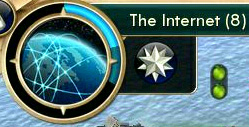 There is only one new technology: The Internet, which has one unknown
ability (reported to be Culture-oriented). None of the existing technologies
appear to have changed location or prerequisites, but there are new unlocks and
a few moved or deleted unlocks. Here is a list of the changes to existing
technologies:
There is only one new technology: The Internet, which has one unknown
ability (reported to be Culture-oriented). None of the existing technologies
appear to have changed location or prerequisites, but there are new unlocks and
a few moved or deleted unlocks. Here is a list of the changes to existing
technologies:
- Animal Husbandry: Caravan, Additional trade route
- Sailing: Cargo Ship, Additional trade route
- Horseback Riding: Caravansary
- Drama and Poetry: Writer's Guild, Parthenon
- Engineering: Additional trade route
- Theology: Borobudur
- Guilds: East India Company replaces National Treasury, Artist's Guild
- Compass: Additional trade route, extends range of sea trade routes
- Machinery: Brazilwood Camp
- Chivalry: Kasbah, Chateau
- Acoustics: Musician's Guild
- Banking: Additional trade route
- Printing Press: Zoo replaces Theater, Globe Theater, World Congress founded
- Navigation: Feitoria
- Architecture: Uffizi
- Metallurgy: Red Fort, Kremlin moved to Railroad
- Archaeology: Archeologist, Reveal Antiquity Sites, Construct Archaeological Dig
- Refrigeration: Hotel, extends range of sea trade routes
- Radio: Broadway
- Flight: Prora, +1 Culture and +2 Gold for Chateau
- Railroad: Kremlin, Additional trade route
- Combustion: extends Caravan range
- Penicillin: additional trade route
- Radar: Airport
- Nuclear Fission: Bazooka
- Telecommunications: National Visitor's Center
- The Internet: doubles Tourism output
- Globalization: no UN, +1 Delegate for each Diplomat in foreign Capitals
Miscellaneous Changes
UI Changes
Religion
 Dennis Shirk mentioned that new religion options had been added;
specifically, Christianity has been split into Catholicism, Protestantism and
Eastern Orthodox. Also, the new Reformation policy at the end of the Piety tree
allows you to choose one from among a set of powerful "Reformation"
Beliefs.
Dennis Shirk mentioned that new religion options had been added;
specifically, Christianity has been split into Catholicism, Protestantism and
Eastern Orthodox. Also, the new Reformation policy at the end of the Piety tree
allows you to choose one from among a set of powerful "Reformation"
Beliefs.
Known Reformation Beliefs:
- Charitable Missions: Influence boosts from Gold gifts to City-States are increased by 30%.
- Evangelism: Missionaries' Spread Religion action erodes existing pressure from other religions.
- Heathen Conversion: Missionaries convert adjacent barbarians to this civilization.
- Jesuit Education: May build Universities, Public Schools, and Research Labs with Faith.
- Religious Fervor: Use Faith to purchase Industrial Era (and later) land units.
- Sacred Sites: All buildings purchased with Faith provide 2 Tourism each.
- The Glory of God: Use Faith to purchase any type of Great Person starting in Industrial Era.
- Underground Sect: Your spies exert religious pressure on the cities they occupy.
- Unity of the Prophets: Inquisitors and Prophets reduce this religion's presence by half (instead of eliminating it).
New Beliefs and Changes to Existing Beliefs:
- Religious Art now gives +5 Tourism to the Hermitage in addition to +5 Culture.
- Tears of God is a new Pantheon belief which gives +2 Faith for Gems and Pearls.
Dennis Shirk: "you definitely want a religion in Brave New World. If you were playing the Culture game, one of the key ways you’re going to be getting great artists, great musicians etc… is through Faith. All the culture buildings have new abilities; the religious buildings can generate culture, things like that. We’ve also added a whole new set of religious belief that’s going to add to all the different areas of the game, whether it’s Diplomatic, or domination… Because of the way of Tourism spreads, spreading your religion is going to be what’s key, so you really want your Religion to be dominant."
Two New Scenarios
 War Between the States
War Between the States
Fight the American Civil War from either the Union or Confederate side as you focus on the critical Eastern theatre of operations between the capital cities of Richmond and Washington.
Scenario Description
April the 12th, 1861. Confederate mortars open fire on Fort Sumter in Charleston harbor, signaling the start of America's Civil War. President Abraham Lincoln issues a call for volunteers for 90-day enlistments, confident that the rebellion can be put down in short order. Jefferson Davis, newly elected President of the Confederate States, is equally optimistic. Davis boldly moves his government to Richmond, Virginia, just 100 miles from Washington, D.C. Can you win a swift victory both sides are predicting? Or will this war test if a nation conceived in liberty can long endure?
Victory Conditions
Win by capturing your opponent's Capital before time runs out.
Special Rules
City razing and Settlers are off. Only cities with one of these production buildings may create units: either the Arsenal (Infantry), Stable (Cavalry), Iron Works (Artillery), or Navy Yard (Naval Units). Capture enemy cities to control these production centers and the Manpower resource, necessary for Infantry units. All units of the player moving first receive just half their usual movement in the opening turn. Cities have no range strike and only minimal defense above the combat strength of any garrison. Great Generals' range increased to 5 and they are displaced to a nearby city rather than killed. Only Military Engineers and Union land units can embark in this scenario.
Ed Beach: "The Civil War scenario focuses on the key conflict in the Eastern Theater where the Union and Confederate capitals were both at risk. It’s a detailed examination of this portion of the conflict with monthly turns."
See units for this scenario here.
Scramble for Africa
The great colonial powers of the world are scrambling to explore the Dark Continent and extend their reach into its interior. Search for the great natural wonders of the heart of Africa as you explore a dynamically-generated continent each time you play (Africa maintains its distinctive outline, but the interior is randomized).
"Europeans had claimed most of the native lands elsewhere, but not yet the dark continent of Africa. Driven by a sense of adventure, a desire for wealth, and the occasional thirst for knowledge, explorers and settlers scrambled into Africa from north and west. There they encountered lost kingdoms, exotic beasts and native empires that challenged their dreams of colonization. Play as one of the European colonial powers or one of the African empires. This scenario features three of the new Civilizations (Morocco, Zulu, Portugal) and three specific to the scenario (Belgium, Italy, Boers). It highlights many of the new unique units and buildings, new Natural Wonders, changes in the economic system, Great Works, archeological digs and customizes game play."
Ed Beach: "The Scramble for Africa scenario is set in late 19th Century Africa, just as the European powers were taking an interest in the Dark Continent. The interior of Africa is randomly generated each game. Combined with a large choice of available civilizations, this is a scenario you can play repeatedly with a different result each time. The trade and archaeology systems both play a key role in the Scramble for Africa."
New Units
There are 20 new units in the expansion, including the altered Great Artist (which is now a great painter, with a new graphic and new abilities).
| Unit | Type | Technology | Cost | Moves | Str. | Ranged Str. |
Range | Required Resource | Notes |
| Pathfinder | Recon | - | 45 | 2 | 8 | - | - | - | Shoshone UU*; Native Tongue, ignores terrain cost |
| Siege Tower | Siege | Mathematics | 75 | 2 | 12 | - | - | - | Assyrian UU*; Sapper, +200% vs Cities, Cover I, +1 Sight, City attack only |
| Hand-Axe | Archery | - | 56 | 2 | 9 | 9 | 1 | - | Barbarian UU*; may not melee attack |
| Kris Swordsman | Melee | Iron Working | 75 | 2 | 14 | - | - | 1 Iron | Indonesian UU*; Mystic Blade |
| Impi | Melee | Civil Service | 90 | 2 | 16 | - | - | - | Zulu UU*; Spear Throw, +50% vs Mounted |
| Great Galleass | Naval Melee | Compass | 110 | 3 | 18 | 20 | 2 | - | Venetian UU*; cannot enter deep ocean |
| Nau | Naval | Astronomy | 120 | 5 | 20 | - | - | - | Portguese UU*; Exotic Cargo, +1 Sight, Withdraw Before Melee |
| Winged Hussar | Mounted | Metallurgy | 185 | 5 | 28 | - | - | 1 Horses | Polish UU*; Heavy Charge, Shock I, Formation I, -33% vs Cities, no def. bonus, move after attack |
| Berber Cavalry | Mounted | Military Science | 225 | 4 | 34 | - | - | 1 Horses | Moroccan UU*; bonus in Desert and friendly territory |
| Comanche Riders | Mounted | Military Science | 200 | 4 | 34 | - | - | 1 Horses | Shoshone UU*; +1 Move |
| Foreign Legion | Gunpowder | Replaceable Parts | 320 | 2 | 42 | - | - | - | Foreign Lands bonus |
| Pracinha | Gunpowder | Plastics | 375 | 2 | 70 | - | - | - | Brazilian UU*; Golden Age from Victories |
| Bazooka | Archery | Nuclear Fission | 375 | 2 | 85 | 85 | 1 | - | May not melee attack |
| XCOM Squad | Gunpowder | Nanotechnology | 400 | 2 | 110 | 0 | - | - | Skyranger |
| Caravan | Trade | Animal Husbandry | 75 | 1 | - | - | 10 | - | Establish Trade Route, Limited Visibility |
| Cargo Ship | Trade | Sailing | 100 | 1 | - | - | 45 | - | Establish Trade Route, Limited Visibility |
| Archaeologist | Civilian | Archaeology | 200 | 4 | - | - | - | - | Construct Archaeological Dig; requires University |
| Merchant of Venice | Civilian | - | - | 2 | - | - | - | - | Trade Mission Bonus |
| Great Artist | Civilian | - | - | 2 | - | - | - | - | Create Great Work, Trigger Golden Age |
| Great Writer | Civilian | - | - | 2 | - | - | - | - | Create Great Work, Create Political Treatise |
| Great Musician | Civilian | - | - | 2 | - | - | - | - | Create Great Work, Concert Tour |
(*UU - "Unique Unit"; a civilization-specific unit) († - purchased with Faith)
Pathfinder
Movement: 2; Strength: 8; Cost: 45; Requires Resource: none
Technology: none; Obsolete with: Scientific Theory
Abilities: Native Tongue (May choose benefit when discovering Ancient Ruins),
Ignores Terrain Cost
Notes: Unique Unit for Shoshone; replaces Scout. Has the strength of a
Warrior and a bonus when discovering Ancient Ruins. Shoshone starts the game
with a Pathfinder instead of a Warrior. If the Pathfinder receives a unit
upgrade from an Ancient Ruin, it upgrades to a Composite Bowman instead of an
Archer, and it does keep both of its promotions.

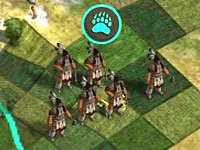


Siege Tower
Movement: 2; Strength: 12; Ranged Attack: 0; Cost: 75; Requires Resource:
none
Technology: Mathematics; Obsolete with: Physics; Upgrades to:
Trebuchet
Abilities: Sapper (Gives +50% bonus vs. Cities to all friendly units within 2 tiles),
Cover I, May only attack cities, +1 Sight
Notes: Unique Unit for Assyria; replaces Catapult. This is a melee siege unit. Looks very much like the
siege engine in this Assyrian relief.
Hand-Axe
Movement: 2; Strength: 9; Ranged Attack: 9; Range: 1; Cost: 56; Requires Resource: none
Notes: This is a Barbarian-only replacement for the Chariot Archer.
Kris Swordsman
Movement: 2; Strength: 14; Ranged Attack: 0; Cost: 75; Requires Resource:
Iron
Technology: Iron Working; Obsolete with: Steel; Upgrades to: Longswordsman
Abilities: Mystic Blade (Promotion is replaced with a randomly chosen promotion
after the unit completes its first combat)
Notes: Indonesian Unique Unit; replaces Swordsman.
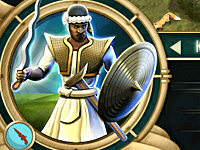
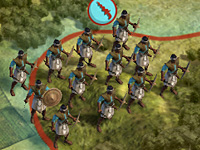

Impi
Movement: 2; Strength: 16; Ranged Attack: 0; Cost: 90; Requires Resource:
none
Technology: Civil Service; Obsolete with: Metallurgy; Upgrades to: Lancer
Abilities: Spear Throw (Before engaging in melee, this unit has an extra
attack), +50% vs Mounted
Notes: Zulu Unique Unit; replaces Pikeman.

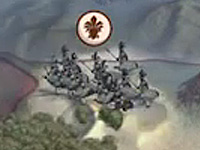
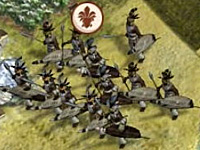
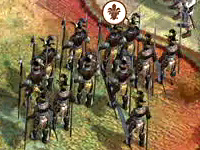
Great Galleass
Movement: 3; Strength: 18; Ranged Attack: 20; Cost: 110; Requires Resource:
none
Technology: Compass; Obsolete with: Navigation; Upgrades to: Frigate
Abilities: Cannot enter deep ocean
Notes: Venetian Unique Unit; replaces Galleass. The Great Galleass is more
powerful than the standard Galleass but also more expensive.

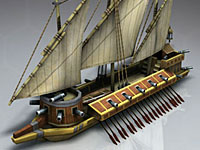
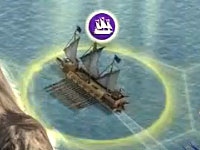
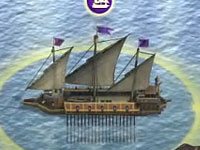
Nau
Movement: 5; Strength: 20; Ranged Attack: -; Cost: 120; Requires Resource: none
Technology: Astronomy; Obsolete with: Steam Power; Upgrades to: Ironclad
Abilities: +1 Sight, Withdraw before Melee, Exotic Goods: "This unit will sell its cargo, earning Gold and
XP. More will be earned for selling farther from your capital. This may only be
done once with this unit." The Nau must be "next to foreign
lands" to use this ability.
Notes: Portuguese Unique Unit; replaces Caravel. The nau is perhaps better known
to the non-Portuguese world as a "carrack."

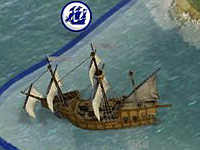

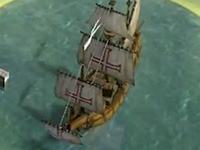
Winged Hussar
Movement: 5; Strength: 28; Ranged Attack: 0; Cost: 185;
Requires Resource:
Horses
Technology: Metallurgy; Obsolete with: Combustion; Upgrades to: Anti-Tank
Gun
Abilities: No Defensive Terrain Bonuses, Can Move After Attack, -33% vs. Cities,
Heavy Charge (Forces defender to retreat if it inflicts more damage than it
receives. A defender who cannot retreat takes extra damage), Shock I (+15% Open
Terrain), Formation I (+33% vs Mounted)
Notes: Polish Unique Unit; replaces Lancer. The Winged Hussar has the ability to force an enemy unit
to retreat or take additional damage.
Berber Cavalry
Movement: 4; Strength: 34; Ranged Attack: -; Cost: 225; Requires Resource:
Horses
Technology: Military Science; Obsolete with: Combustion; Upgrades to: Landship
Abilities: No Defensive Terrain Bonuses, Can Move After Attack, -33% vs. Cities,
Desert Warrior (+50% in Desert), Homeland Guardian (+25% in home territory)
Notes: Moroccan Unique Unit, replaces Cavalry. "Mounted unit that
specializes in Desert warfare and protecting Moroccan lands."

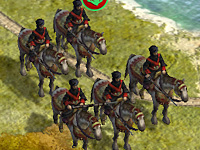
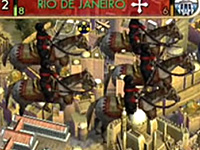
Comanche Riders
Movement: 4; Strength: 34; Ranged Attack: -; Cost: 200; Requires Resource:
Horses
Technology: Military Science; Obsolete with: Combustion; Upgrades to: Landship
Abilities: No Defensive Terrain Bonuses, Can Move After Attack, -33% vs. Cities,
Full Moon Striker (+1 Movement)
Notes: Shoshone Unique Unit, replaces Cavalry. "Mounted unit that
specializes in quick attacks. Cheaper and faster than the base unit."


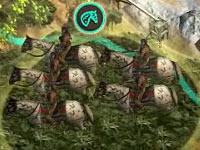

Pracinha
Movement: 2; Strength: 70; Ranged Attack: -; Cost: 375; Requires Resource:
none
Technology: Plastics; Obsolete with: Mobile Tactics; Upgrades to: Mechanized
Infantry
Abilities: Success in combat adds resources to
your Golden Age meter.
Notes: Brazilian Unique Unit; replaces Infantry. "Pracinhas"
is a term for the Brazilian Army soldiers who fought in World War II for the
Allies in the
European theatre.
Bazooka
Movement: 2; Strength:85 Ranged Attack: 85; Cost: 375; Requires Resource:
none
Technology: Nuclear Fission; Obsolete with: -
Abilities: May not melee attack
Notes: This is the new final unit in the ranged upgrade line; Machine Gun now
upgrades to Bazooka instead of Mechanized Infantry. It does not have any
anti-Armor bonuses.
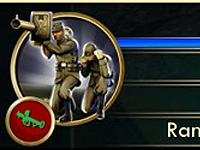

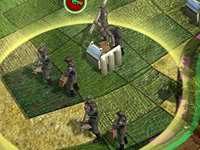
XCOM Squad
Movement: 2; Strength: 110; Ranged Attack: 0; Cost: 400; Requires
Resource: none
Technology: Nanotechnology; Obsolete with: -
Abilities: Skyranger (range 40 paradrop)
Tech Tooltip: "Futuristic infantry unit skilled at dropping into danger from far
across the world. Squad can move and pillage after landing but cannot enter
combat until the following turn. Good Luck, Commander!"
Notes: A future-era upgrade to the
Paratrooper (and a tie-in with Firaxis' XCOM Enemy Unknown).
Merchant of Venice
Movement: 2
Abilities: Conduct Trade Mission, Construct Customs House
Notes: Venetian Unique Unit; replaces Great Merchant. Aside from the ability to
conduct a Trade Mission, the Merchant of Venice can purchase City-States
outright, bringing them under Venetian control as a Puppet. The Merchant of
Venice is expended when used in this way, and there is no other monetary cost.
Venice receives a Merchant of Venice instead of a Settler in situations in which
they would normally be awarded a Settler (such as with the Collective Rule
policy in the Liberty tree).

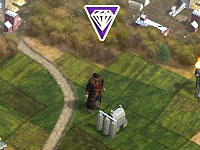

Archaeologist
Movement: 4
Technology: Archaeology
Abilities: Construct Archaeological Dig: "Converts the Antiquity Site into an
Archaeological Dig, which can yield a Great Work Artifact or be transformed into
a Landmark improvement." After 3 turns, you can choose an Artifact (+2
Culture, +2 Tourism), or a Landmark (+1 Culture per Era older than the civ's
current Era). The Archaeologist is consumed.
Notes: A civilian unit for finding Artifacts in Antiquity Sites, which,
unsurprisingly, looks like Indiana Jones. It has a worker-like Build Actions
menu, including the the Ability to Construct an Archaeological Dig on Antiquity
Sites. Archaeologists can be created in any city with a University.
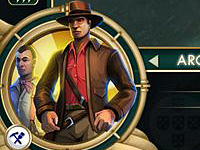
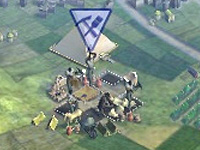
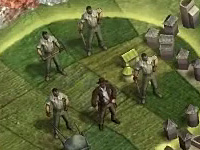

Awww... they changed the graphic to look less like Indiana Jones.

Caravan
Movement: 1*; Range: 10, Cost: 75
Technology: Animal Husbandry
Abilities: Establish Land Trade Route
Notes: Caravan units are the earliest trade unit. The graphic is a string of three camels. They appear to be very slow (the Caravan
in the demo moved only two hexes along a road in one turn), and have a maximum
range of 10 hexes. Trade Unit movement is automated between target cities, in a
similar way as Air units.

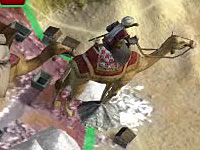


The Caravan upgrades in later eras:




Cargo Ship
Movement: 1*; Range: 45, Cost: 100
Technology: Sailing
Abilities: Establish Sea Trade Route
Notes: Used to enable International Trade Routes over sea. *The Movement
value in the game UI is listed as 1, but the actual unit made an automated
movement of about 5 hexes in a single turn. Trade Unit
movement is automated between target cities, in a similar way as Air units.
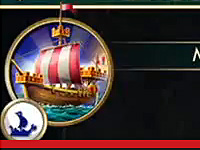



The example above is from the Renaissance. It appears that similar to a Worker, the Cargo Ship receives graphic updates (and presumably better abilities) in later eras (note it still has the same icon).
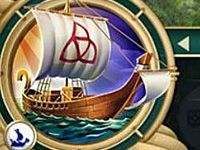
Great Artist
Movement: 2
Abilities: Create Great Work, Trigger Golden Age
Notes: The Great Artist is now really a "Great Painter." The graphic and icon
for the Great Artist has changed; the graphic is now a painter and his two
assistants (instead of a troupe of performers), and the icon is that of a
painter's palette. Can still trigger a Golden Age, but it appears that there is
no longer the ability to construct a Landmark. Landmarks may now be solely the
product of an Archaeological Dig site.
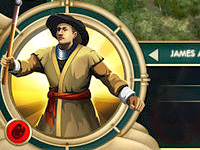



Great Musician
Movement: 2; Strength: 120 Tourism
Abilities: Create Great Work, Perform Concert Tour: "This order will consume the
Great Person and will spread a large quantity of Tourism to the civilization
where the Musician is located. Other civs in the game also receive 20% of this
Tourism."
Notes: Can expend itself to Create Great Work of Music. There is also a second triggered
ability with a violin icon: Concert Tour, which is the Tourism equivalent of the
Culture Bomb (no doubt related to its Tourism strength of 120).
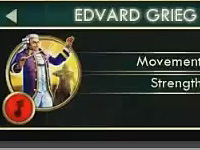
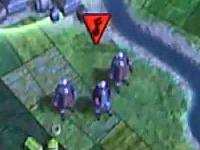
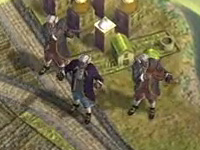

The modern version of the graphic is a three-piece rock band. And yes, the bass player is a girl.



Great Writer
Movement: ?
Abilities: Create Great Work, Create Political Treatise
Notes: Create Political Treatise is a sort of internal Culture Bomb: a one-time
boost of Culture.



Scenario-Specific Units
War Between the States
Some of the graphics shown below are modded versions of the Civil War units included with Gods & Kings, which are the same ones being used in the War Between the States scenario.
Union & Confederate Infantry
Notes: Appears to be based on the standard Rifleman, but with geometry changes (no bayonets, for one).




Carbine-armed Cavalry
Notes: Appears to be different from standard Cavalry only in coloration.


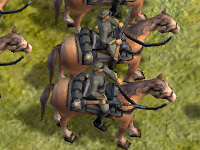
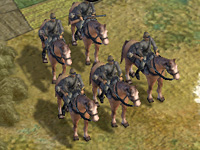
Pistol-armed Cavalry
Notes: Variant of the standard Cavalry model armed with pistols instead of carbines.



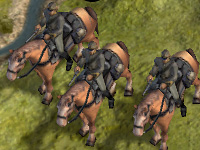
Napoleon Cannon
Notes: The Napoleon was a smoothbore bronze 12-pounder field gun.




Parrott Cannon
Notes: the Parrott was a rifled iron cannon, fielded in various sizes from a 10-pounder field gun to huge siege guns. It had greater range and accuracy than smoothbore cannon, but was more prone to mechanical failure.
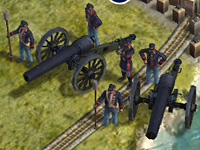



Union Ironclad (USS Monitor)
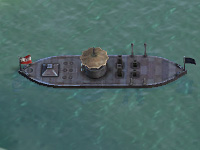



Confederate Ironclad (USS Merrimac/CSS Virginia)




Union & Confederate Generals
Notes: The Union version has a cigar. Nice touch.



New Buildings & Wonders
The expansion adds 8 New Wonders and 13 new buildings.
Wonder: Borobudur
Technology: Theology
Cost: 300
Yield: +5 Faith
Effect: 3 free Missionaries appear. Must be built in a Holy City.
Notes: A 9th-century Buddhist temple in Indonesia.
Wonder: Broadway
Technology: Radio
Cost: 1060
Yield: +2 Culture
Effects: 1 free Great Musician appears near the City where the Wonder was
built. Contains 3 slots for Great Works of Music.
Wonder: Globe Theater
Technology: Printing Press
Cost: 500
Yield: +2 Culture
Effects: 1 free Great Writer appears near the City where the Wonder was built.
Contains 2 slots for Great Works of Writing.
Notes: The theater in London associated with William Shakespeare.
Wonder: Parthenon
Technology: Drama and Poetry
Cost: 250
Yield: +4 Culture
Effects: Contains a prebuilt Great Work of Art in the Great Work Slot.
Notes: The temple of Athena on the Acropolis in Athens, Greece. Shown in the
illustration accompanied by Roman troops, for some reason.
Wonder: The Uffizi
Technology: Architecture;
Requires Aesthetics
Cost: 625
Yield: +2 Culture
Effects: Requires Aesthetics. 1 free Great Artist appears near the City where
the Wonder was built. Contains 3 slots for Great Works of Art.
Notes: "The Office;" a famous art museum (formerly a Medici-built government
office building) in Florence, Italy.
Wonder: Prora
Technology: Flight
Cost: 1060
Yield: +2 Happiness
Effects: Requires Autocracy. In addition to the +2 happiness Happiness, the
Prora Resort also provides +1 more happiness Happiness for every 2 Policies you
have adopted. 1 Free Social Policy. Must be constructed in a coastal city.
Notes: Prora is a Nazi-built seaside resort on the island of Rügen,
on the northern coast of Germany.

Wonder: Red Fort (Lal Qila)
Technology: Metallurgy
Cost: 625
Yield: +1 Culture, +12 Defense, +1 Great Scientist Points
Effects: Defensive Buildings in all Cities are 25% more effective. (This is the
effect that the Kremlin used to have).
Notes: A 17th-century fortress constructed by the Mughal emperor Shah Jahan in
Delhi, India.


Wonder: International Space Station
Effects: +1 Production from Scientists, +1 Science from Engineers, and Great
Scientists provide +33% more Science when used to discover a tech. If you have
crew on board, you’ll receive a free Great Scientist. If you contributed parts,
you’ll get a one-time research boost.
Notes: The ISS is not built like a normal wonder, but instead is awarded to the
first-place contributor in the International Space Station project initiated by
the World Congress. Kate Distler: "If you’re the primary contributor, you’ll earn Mission
Control and the International Space Station Wonder, which appears in your
capital.

(Wonder: The Motherland Calls)
Notes: A giant Soviet-era statue in Volgograd commemorating the Battle of Stalingrad. The wonder painting shown below was released with the initial batch of information in March, but currently there is no sign of this wonder in the tech tree, so it appears that The Motherland Calls did not make it into the final product.
National Wonder: National Visitor's Center
Technology: Telecommunications
Cost: 400; Maintenance: 2
Effects: 100% of the Culture from World Wonders, Natural Wonders, and
Improvements (Landmarks, Moai, Chateau) is added to the Tourism output of the
city. Tourism output from Great Works +100%. Must have built a Hotel in all
Cities. The cost goes up the more cities there are in the empire.

National Wonder: East India Company
Technology: Guilds
Cost: 125
Yield: +4 Gold
Effects: Must have built a Market in all Cities. The cost goes up the more
cities there are in the empire. Trade routes other players make to a city with
an East India Company will generate an additional 4 Gold for the city owner and
the trade route owner gains an additional 2 Gold for the trade route.
Notes: Kate Distler: "The East India Company is a National Wonder (replacing the earlier
National Treasury) that is associated with having Markets in every City. It’s
effect is pretty much the reverse of the Caravansary, providing a boost to
routes that connect INTO a city."

Artist's Guild
Technology: Guilds
Cost: 150; Maintenance: 1
Yield: 2 Great Artist Points
Specialists: 2 Artists
Effects: Provides +2 Great Person Points towards a Great Artist. Add up to
two specialists to the building to gain Culture and increase the rate of Great
Artists acquisition (3 Culture and 3 GPP per specialist).
Notes: "The Artist's Guild allows you to generate Great Artists by assigning
specialists to it. A Great Artist is a new type of Great Person that allows you
to create Great Works of Art, essential for generating Tourism and winning a
Culture Victory." Guilds behave like National Wonders; only one of each
type can be built by each civilization, and they cannot be purchased with gold.

Musician's Guild
Technology: Acoustics
Cost: 200; Maintenance: 1
Yield: 3 Great Musician Points
Specialists: 2 Musicians
Effects: Provides +3 Great Person Points towards a Great Musician. Add up to
two specialists to the building to gain Culture and increase the rate of Great
Musicians acquisition (3 Culture and 3 GPP per specialist).
Notes: "The Musician's Guild allows you to generate Great Musicians by
assigning specialists to it. A Great Musician is a new type of Great Person that
allows you to create Great Works of Music, essential for generating Tourism and
winning a Culture Victory." Guilds behave like National Wonders; only one
of each type can be built by each civilization, and they cannot be purchased
with gold.

Writer's Guild
Technology: Drama & Poetry
Abilities: "Provides +1 Great Person Points towards a Great Writer. Add up to
two specialists to the building to gain Culture and increase the rate of Great
Writer acquisition (3 Culture and 3 GPP per specialist)."
Notes: "The Writer's Guild allows you to generate Great Writers by assigning
specialists to it. A Great Writer is a new type of Great Person that allows you
to create Great Works of Writing, essential for generating Tourism and winning a
Culture Victory." Guilds behave like National Wonders; only one of each
type can be built by each civilization, and they cannot be purchased with gold.

Unique Building: Ducal Stable
Technology: Horseback Riding
Cost: 75
Abilities: Unique Polish Stable replacement. +15% production Production and +15
XP for Mounted Units. Each Pasture worked by this City produces +1 production
Production and +1 gold Gold.

Unique Building: Royal Library
Technology: Writing
Cost: 75; Maintenance: 1
Effects: Unique Assyrian Library replacement. +1 research Science for every 2
citizen Citizens in this City. Also has a slot for a Great Work of Writing
which, when filled, gives extra XP to trained Units.

Unique Building: Ikanda
Technology: Bronze Working
Cost: 75; Maintenance: 1
Notes: Zulu Unique Building; replaces Barracks. Grants unique promotions to
pre-gunpowder melee units.

Unique Building: Candi
Technology: Theology
Cost: 120; Maintenance: 1
Yield: +2 Faith
Effects: Unique Indonesian Garden replacement. +25% great people Great People
generation in this City, and +2 peace Faith for each World Religion that has at
least 1 follower in the city. City must be built next to a River or Lake.

Building: Airport
Technology: Radar
Cost: 400; Maintenance: 5
Effects: Allows airlifts to or from this city. 50% of the culture Culture from
World Wonders, Natural Wonders, and Improvements (Landmarks, Moai, Chateau) is
added to the tourism Tourism output of the city. tourism Tourism output from
Great Works +50%.

Building: Hotel
Technology: Refrigeration
Cost: 300
Notes: "50% of the Culture from World Wonders, Natural Wonders, and Improvements
(Landmarks, Moai, Chateau) is added to the Tourism output of the city. Tourism
output from Great Works +50%."

Building: Caravansary
Technology: Horseback Riding
Cost: 120
Abilities: Land trade routes originating from this city have a 50% increase in
range and produce an additional 2 Gold when connecting to another civilizations.
Notes: Kate Distler: "The Caravansary is a Classical-era building that
improves the range and Gold yield of land trade routes heading OUT of a city.
The East India Company is a National Wonder (replacing the earlier National
Treasury) that is associated with having Markets in every City. It’s effect is
pretty much the reverse of the Caravansary, providing a boost to routes that
connect INTO a city."

Building: Zoo
Technology: Printing Press
Cost: 200; Maintenance: 2
Requires: Colosseum
Yield: +2 Happiness
Abilities: Cannot provide more Happiness than there are Citizens in a city. City
must have a Colosseum.
Notes: The Zoo has replaced the Theater, and is the new prerequisite for the
Stadium.

Changes to Existing Buildings & Wonders
Many Culture buildings have had the amount of base +Culture reduced, but have added slots for Great Works, that provide both Culture and Tourism. Many Gold-producing buildings have had the amount of base +Gold reduced, but provide added bonuses for Trade Routes.
Palace: 1 Great Work of Art slot
Louvre: 4 Great Work of Art slots
Great Library: 2 Great Work of Writing slots
Amphitheater: 1 Great Work of Writing slot
Museum: 2 Great Work of Art slots
Opera House: 1 Great Work of Music slot
Heroic Epic: 1 Great Work of Writing slot
National Epic: 1 Great Work of Writing slot
Sistine Chapel: 2 Great Work of Art slots
Market: Now provides a base +1 Gold (down from +2) and +25% Gold, but International Trade Routes
with this city will generate an additional +2 Gold for the city owner and +1
Gold for the originator of the trade route. Still has one Merchant Specialist
slot.
Eiffel Tower: Now provides +5 Happiness, +1 Culture, +2 Great Merchant
Points, and +12 Tourism instead of the Happiness per
Social Policy effect (which has now been moved to Prora).
Kremlin: Requires Order Ideology. +50% Production when building Armor
units, 1 free Social Policy.
National Treasury: Appears to have been removed.
Theater: Appears to have been replaced by Zoo.
Mughal Fort: Now gives a Tourism bonus (instead of a Culture bonus) after
researching Flight.
Terracotta Army: Creates a copy of each type of military land unit you
control and places the unit near the city where the Terracotta Army is
constructed.
Colossus: Gains an additional trade route slot and a Cargo Ship appears
in the city. Trade routes other players make to a city with the Colossus will
generate an extra 2 Gold for the city owner and the trade route owner gains an
additional 1 Gold for the trade route. City must be built on the coast.
Petra: +1 Food, +1 Production for all desert tiles worked by this city
(except Flood Plains). Gains an additional trade route slot and a Caravan
appears in the city. +6 Culture once Archaeology is discovered. City must be
built on or next to Desert.
The Forbidden Palace: Requires Patronage. Grants 2 additional Delegates
in the World Congress. -10% Unhappiness from Citizens in non-occupied Cities.
United Nations: The World Congress becomes the UN, and begins the voting
for Diplomatic Victory. Possession of the UN gives the owner 3 additional
Delegates.
New Improvements
Brazilwood Camp
Technology: Machinery
Yield: +2 Gold, +2 Culture with Acoustics
Notes: Unique Improvement for Brazil. Can be placed on Jungle. Produces
additional gold, and after researching Acoustics produces additional culture as
well. Brazilwood was an important early export of Brazil, from the which the
country eventually took its name.



Chateau
Technology: Chivalry
Yield: +2 culture and +2 gold, with additional culture (+1) and gold(+2) after
researching Flight. Confers a 50% defense bonus. Must be built next to a luxury
resource. Cannot be built adjacent to another Chateau. A Hotel adds 50% of the
Culture from the Chateau to the city as Tourism.
Notes: New Unique Improvement for France. France has
received substantial changes; with a new culture-oriented Unique Ability, and
this new culture-producing Unique Improvement to replace its second Unique Unit
(the Foreign Legion now appears to be a special unit awarded by a Freedom Tenet).

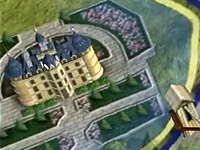


Feitoria
Technology: Navigation
Notes: Portuguese Unique Improvement. You build it in the territory of a
city-state, and it provides you with a copy of whatever Luxury resources the city-state
is producing. If the city-state becomes an ally, Portugal will receive double
resources. It seems likely that the Feitoria can only be built on the coast.
Construct a Feitoria tooltip: "Constructs a Feitoria in this City-State's lands.
It will provide to you one copy of every Luxury Resource type connected by this
City-State, regardless of your relationship with the City-State. Also provides a
defensive bonus." Pillaging a Feitoria means declaring war on Portugal.




Kasbah
Technology: Chivalry
Notes: Unique Improvement for Morocco. "A Kasbah can only be built on a
Desert tile. It provides one additional Food, Production, and Gold. It also
provides the same +50% defense bonus as a Fort. Must be built in Moroccan
territory." In one part of the Rev3Games video, a Kasbah is shown on top of
a Farm, but I think that may be an error.




Antiquity Site
Technology: revealed with the discovery of Archaeology.
Notes: These appear starting in the Industrial era at sites of earlier
battles, ancient ruins, or destroyed barbarian camps, and can be investigated by
Archaeologists. See Archaeology.
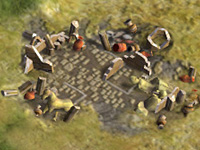
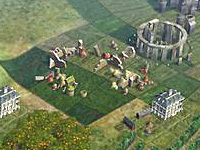


Archaeological Dig
Notes: Created by an Archaeologist unit on an Antiquity Site. The dig can yield an Artifact, or be transformed into a Landmark. The Archaeologist appears to work the dig site for 3 turns. The yield of a Historical Landmark increases depending on the age of the site, and it provides Tourism as well as Culture. It's possible to create digs in foreign territory, but there may be diplomatic repercussions.




Landmark
Notes: Landmarks are no longer created by Great Artists, but instead can be created from an Antiquity Site by an Archaeologist. When worked, a Landmark provides Culture based on its age: +1 Culture per Era older than your civilization's current Era. The Archaeologist is consumed in the process. The graphic appears to be the same as in previous versions.

New Natural Wonders
King Solomon's Mines
Yield: +6 production


Lake Victoria
Yield: +6 Food
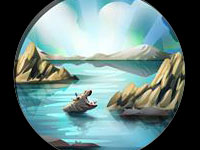
Kilimanjaro
Yield: +3 Food, +2 Culture. Adjacent units move at double speed through Hills and receive a combat bonus on Hills for the rest of the game.

New Resources
It appears that the only new resources are those associated with Indonesia's special ability: Nutmeg, Cloves, and Pepper. The first three times Indonesia founds a city on a brand new continent (where it hasn’t yet founded a city) it gets two copies of One of the special resources. This resource cannot be razed or destroyed, and it can be traded as desired.


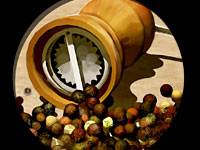
Unidentified Items
This is a temporary holding section for the mysterious and the unexplained! Nothing here at the moment.
Preview Links
2K Official Site
Firaxis announcement
Gamespot announcement
IGN announcement
PC Gamer announcement and interview
Rock, Paper, Shotgun announcement and interview
Civilized.de interview with Ed Beach
Gamezilla.pl interview (Polish)
Eurogamer.de preview (German)
PAX East 3/23 demo on
YouTube
PAX East 3/24 demo on
YouTube
GameSpot PAX East report
GNN article (Chinese)
Escapist Magazine interview with Ed Beach
Escapist: Shaka Returns
Revision 3 early look
(YouTube)
Game Reactor interview with Dennis Shirk
Rock, Paper, Shotgun preview
GameSpot Top 10 Tweetable Truths
DigitalSpy preview
GamesKult preview (French)
Curse interview with Ed
Beach (YouTube)
GamerHub interview with
Dennis Shirk (YouTube)
Beefjack interview with Dennis Shirk
StrategyInformer interview with Dennis Shirk
Rev3Games interview with Ed
Beach (YouTube)
Enter a Brave New World
featurette 1: Culture and Tourism (YouTube)
2K BNW Q&A (very brief)
Rev3Games gameplay preview
(YouTube)
IGN video preview
Dualshockers preview
GameSpot new civilizations overview
Bahamut Game Crazy video
preview (YouTube, Chinese)
Gamer.nl video playthrough (Dutch)
Enter a Brave New World
featurette 2: Policies and Ideologies (YouTube)
2KGames BNW Q&A part 2
Enter a Brave New World
featurette 3: Trade Routes (YouTube)
2KGames BNW Q&A part 3
Let's Play Brave New World
video (German)
2KGames BNW Q&A part 4
Polygon Behind the Scenes of Brave New World
PCGamer: Brave New World's final two civs
Rev3Games Venice and
Shoshone overview (YouTube)
2KGames BNW Q&A part 5



